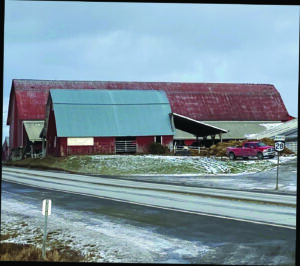
Otsego Assemblyman warns state’s Farm Wage panel against drop in overtime threshold
Otsego County farmers and their representatives wait anxiously as New York’s Department of Labor inches toward establishing its overtime work threshold for farm workers across the state — a decision that could come soon.
Assemblyman Chris Tague (R), whose district includes a broad swath of the county and a former dairy farmer himself, isn’t optimistic about the outcome.
“I was disappointed when I listened to Governor Hochul’s State of the State message last week,” he said. “When she started talking about increasing tax credits for farmers to offset operating costs, to me, that was a private message that the Wage Board will drop the overtime threshold.”
“It was like she was saying to the farmers, ‘Here. We’ll give you some tax credits but we’re going to increase your operating costs by 40 percent,” the Assemblyman said. “People are already paying enough. Tax credits aren’t the answer.”
Assemblyman Tague defended the state’s farming community at a January 4 virtual public hearing, during which New York State Commissioner of Labor Roberta Reardon and the three members of the Farm Laborers Wage Board heard testimony from more than three dozen speakers. Buffalo Urban League President Brenda McDuffie chairs the Board, which also comprises New York Farm Bureau President David Fisher and former New York State AFL-CIO President Denis Hughes.
“It was a long session but I was very impressed by the way Chairwoman McDuffie ran the meeting,” he said. “She listened to every person’s testimony. She shows real knowledge about the issues facing farmers and I thought it was a very fair process.”
The Assemblyman nonetheless remains concerned that the Wage Board ultimately will reduce the overtime threshold for farm laborers from 60 hours per week to 40. New York’s 2019 “Farm Laborers Fair Labor Practices Act” requires the Board to consider the reduction and whether “any such reduction should be phased in through a series of successively lower thresholds.”
New York last adopted the phase-in tactic for increasing the state’s minimum wage to $15/hour in areas outside of metropolitan New York.
“Given what I heard in the State of the State, I think it’s a foregone conclusion,” Assemblyman Tague said of the Board’s ultimate decision. Citing a report from Farm Credit East promising a 42 percent increase in a farm’s cost of labor were the threshold to drop to 40 hours, he said he fears for farmers’ ability to compete against other states.
“Farmers get told how much they’re going to pay for fuel, energy, their mortgage, their equipment, their labor,” he said. “They have no choice in what they’ll get paid for their product. They’re told every month what they’ll get paid but somebody else is setting their overhead.”
“For farmers, labor gets paid first,” he said. “I know that is the case for nearly 100 percent of the farms in New York State. I want everyone to make a decent living. I want everyone to do well and if they’re working on a farm, I want them to be able to make that decent living. I just don’t see how farmers can keep up.”
California dropped its overtime threshold for agricultural workers to 40 hours beginning January 1, 2022 – a precedent not lost on Assemblyman Tague.
“All we do is follow California,” he said. “New York should be setting the precedent. We should be the leader across the world. Instead we outsource our processing. Schools in New York get their milk from farms in New Jersey, Pennsylvania, and Connecticut. We can’t keep doing that.”
“My colleagues in the state Legislature like to say they’re there for the little guy,” he said. “Something like this overtime threshold will really hurt the small farmers. Let’s hope we’re there for the little guy.”
The Wage Board plans two final hearings on the already-delayed overtime decision on January 18 and January 20, after which it will render its decision.

